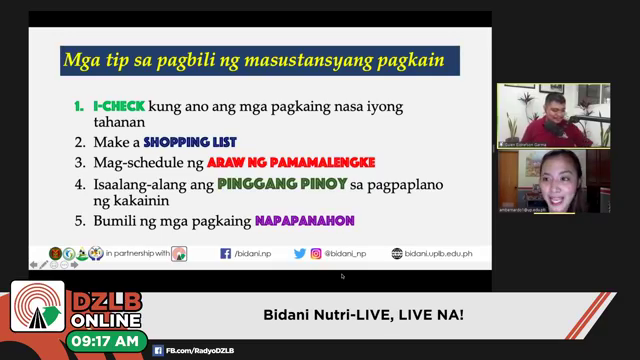Despite the challenges brought about by the pandemic in the food supply, providing and preparing safe and nutritious food for the family remains relevant and important.
Assistant Professor Aiza Kris Bernardo of the Institute of Human Nutrition and Food (IHNF) of the UPLB College of Human Ecology (CHE) discussed the various tips in buying and preparing nutritious food for the family in the sixth episode of BIDANI NutriLive, BIDANI Network Program’s online nutrition school-on-the-air program aired on Radyo DZLB last 06 December 2020.
aProf. Bernardo shared some tips when one buys and prepares food for the family, as follows:
- Check the food that you currently have at home. To avoid buying food that’s already plenty in your house, and to avoid missing food that you need to buy, check first your current food supply.
- Make a shopping list. This makes market or grocery shopping easier, as you know what to get and where you can get the food that you need to buy. You can also save time by doing so.
- Schedule a regular market/grocery day. This is in order for you to not make frequent trips, which can be costly, especially during the pandemic.
- Take into consideration the Pinggang Pinoy during food and menu planning. Pinggang Pinoy is a visual food guide developed by the Food and Nutrition Research Institute of the Department of Science and Technology (FNRI-DOST) that contains appropriate proportions of go, grow, and glow foods and water for different age groups.
- Buy fruits and vegetables that are in season. Off-season produce are usually more expensive than those that are in season.
- If you can, buy in bulk. Buying in bulk can be money-saving, especially when making barters in markets. This also saves you transportation costs/fare and time.
- Do not hesitate to barter. Make sure that the products you buy are of the right weight. Ensure that you are given the right change for your payment.
- Inspect the food items you need to buy. In the case of fresh produce, ensure that they are not yet rotten or spoiled. For packed and canned goods, ensure that the packaging remains intact and not damaged.
aProf. Bernardo also discussed important pointers when buying fresh and packed/canned produce. Meat, for instance, should have no discolorations and foul smell. In buying fish, ensure that the scales are still intact, and that the eyes are clear.
Fresh eggs should have a rough shell, and should sink when put in a basin full of water. Rice grains should not be crushed, dry, and have no foul odor. Fruits and vegetables should be bright, not pale.
Canned and packed goods, meanwhile, should not have their seal or packaging damaged. Check the expiration date as well.
aProf. Bernardo also shared some tips in food preparation and storage. She said that fresh fruits and vegetables should be rinsed in running water. Lids of packaged foods should be wiped before opening. Meat, fish, and other perishables should be stored in a refrigerator or freezer, whichever is appropriate, within two hours after purchase. The kitchen and other areas where food are prepared and stored should always be clean and sanitized.
There are four steps in food safety, according to aProf. Bernardo, namely: linisin, paghiwalayin, lutuin, palamigin.
Finally, aProf. Bernardo shared that food safety, and the safety of people who buy and prepare food for the family, should remain a priority.
– Guien Eidrefson Garma

